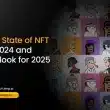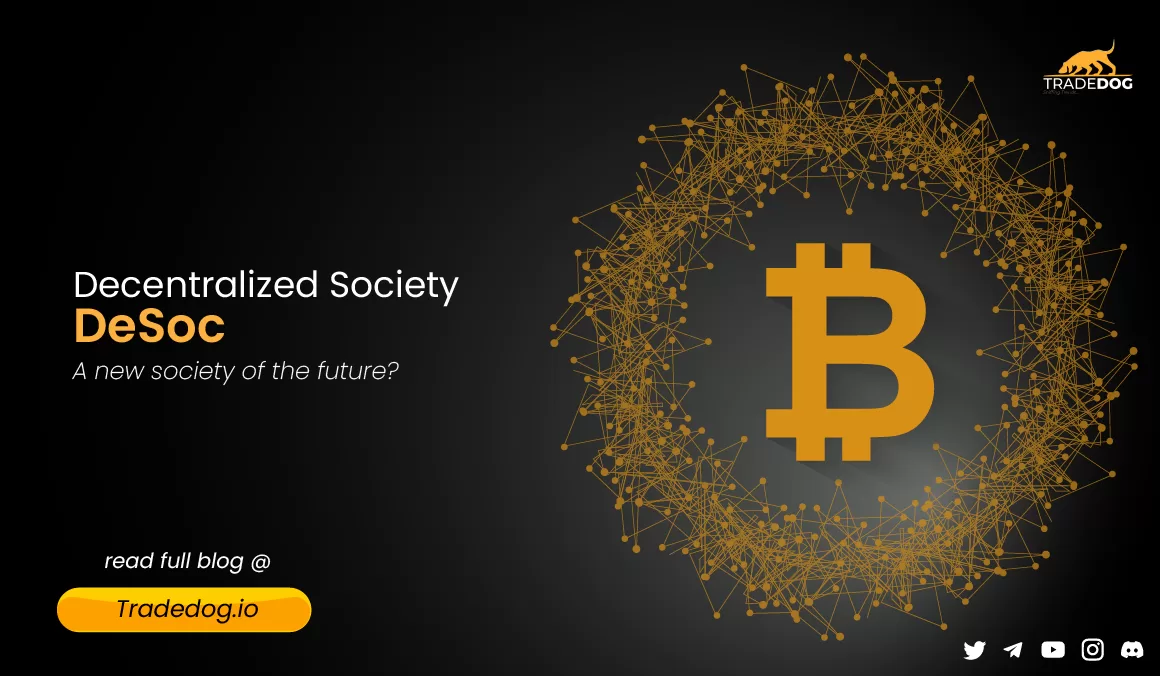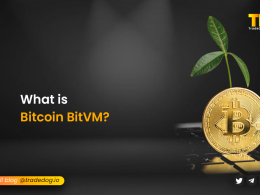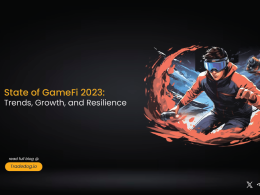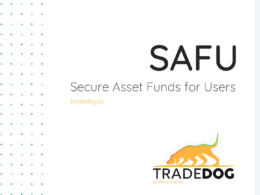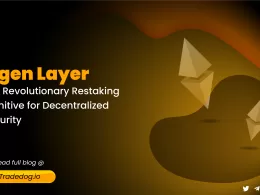Quick Links
Imagine a world where every person is connected to each other in a decentralized way. Imagine a world with blockchain-powered track records for web3 users to encourage businesses to set up shop and help people access services. This society is the potential future of the web3 ecosystem called DeSoc or Decentralized society. In recent years, there has been increasing interest and discussion around the concept of a decentralized society, where power and decision-making are distributed among individuals and communities, rather than being centralized in the hands of a few. At the heart of this idea are four pillars: decentralized law/governance, decentralized finance, decentralized production, and decentralized communication. These pillars are key components of a decentralized society and offer the potential for increased transparency, fairness, and autonomy for individuals. In this blog, we will explore each of these pillars in detail, discuss the challenges and opportunities they present, and examine how they are being implemented in practice. Join us as we explore the fascinating world of decentralized society and what it could mean for the future of our societies.
What is a Decentralized Society (DeSoc)?
DeSoc or Decentralized society is an umbrella term for traditional activities that will eventually get decentralized in the near future. Although it is a new web3 ecosystem known as the “Decentralized Society” (DeSoc) attempts to produce a tamper-proof record of web3 users’ identities and social connections in order to pave the way for a society with a variety of ideologies. In the modern economy, service providers look at a person’s past to evaluate whether they would be a trustworthy customer. People, in turn, rely on their existing records, including their financial and rental ones (IDs, credit ratings, degrees, and certifications). Essentially, the conventional economy significantly depends on reputation and authenticity to motivate consumer and service provider action.
In recent years, the idea of a decentralized society has gained increasing attention and popularity. A decentralized society is one where power and decision-making are distributed amongst individuals and groups rather than being concentrated in the hands of a few. The concept is often associated with blockchain technology and cryptocurrency, but its implications are much broader. Later, will explore the four pillars of a decentralized society: decentralized communication, decentralized law, decentralized production, and decentralized finance.
Decentralized communication
It is the first pillar of a decentralized society. In a centralized system, communication channels are controlled by a few powerful entities, such as governments, corporations, or social media companies. These entities can manipulate the flow of information to their advantage, censor certain voices, and even distort the truth. In a decentralized system, communication channels are open and accessible to all, and no single entity has the power to control or manipulate them.
Blockchain technology has enabled the creation of decentralized communication networks, such as the blockchain-based social media platform Steemit or the encrypted messaging app Signal. These platforms use a peer-to-peer architecture, where users communicate directly with each other without the need for intermediaries. This not only promotes free speech and privacy but also reduces the risk of cyberattacks and data breaches.
Decentralized law
This is the second pillar of a decentralized society. In a centralized system, laws and regulations are made and enforced by a government or a ruling authority. This can lead to a lack of transparency, accountability, and responsiveness to the needs of the people. In a decentralized system, laws and regulations are created and enforced through a bottom-up process, where individuals and communities collaborate to establish common rules and standards.
Blockchain technology has also enabled the creation of decentralized legal systems, such as smart contracts. Smart contracts are self-executing contracts with the terms of the agreement between buyer and seller being directly written into lines of code. The code and the agreements contained therein exist on a decentralized blockchain network, making them tamper-proof, transparent, and accessible to all parties involved. This eliminates the need for intermediaries, such as lawyers or courts, and reduces the time and cost associated with legal disputes. Refer to the blog to find out more about smart contracts.
Another example of decentralized law is the concept of decentralized autonomous organizations (DAOs). DAOs are organizations that are run through rules encoded as computer programs on a blockchain. Members of a DAO can vote on proposals and make decisions collectively, without the need for a central authority to make decisions for them.
At the time of writing, the top 5 projects with DAO management are listed in the image above. Uniswap has a treasury worth $2.6 Bn with more than 300K holders followed by BitDao and ENS. In the current web3 space, almost all the projects are creating their own DAO which basically comprises the governance token holder. The DAO members have the authority to make changes and contribute to the platform’s growth.
Decentralized production
In a centralized system, production is controlled by a few powerful corporations, often with little regard for social or environmental sustainability. This can lead to the exploitation of workers, depletion of resources, and environmental degradation. In a decentralized system, production is organized in a way that maximizes social and environmental benefits while minimizing negative externalities.
Blockchain technology has enabled the creation of decentralized production networks, such as the blockchain-based supply chain platform Provenance or the decentralized renewable energy marketplace Power Ledger. These platforms enable producers to demonstrate their sustainability credentials and enable consumers to make informed choices about the products they purchase. They also enable producers and consumers to engage in peer-to-peer transactions, bypassing intermediaries and reducing transaction costs.
Decentralized production is made possible by the use of smart contracts, which are self-executing programs that run on a blockchain. These contracts can be programmed to automatically execute specific actions based on predefined conditions, without the need for intermediaries.
One example of decentralized production using blockchain technology is the supply chain management of agricultural products. Blockchain can be used to track the entire journey of a product from the farm to the store, ensuring transparency and traceability. This can help prevent fraud, reduce waste, and increase efficiency.
Another example of decentralized production is the creation and distribution of digital content. With blockchain, content creators can directly sell their work to consumers without intermediaries, such as music streaming services or social media platforms. This can lead to fairer compensation for creators and greater control over their work.
Decentralized production can also be used in the energy sector, where blockchain can be used to enable peer-to-peer energy trading among households with solar panels. This can reduce the reliance on centralized energy providers and increase the use of renewable energy sources.
Decentralized finance
In a centralized system, the financial system is controlled by a few powerful banks and financial institutions, often with little regard for the needs of the people. This can lead to financial exclusion, inequality, and instability. In a decentralized system, the financial system is organized in a way that maximizes inclusivity, fairness, and stability.
Blockchain technology has enabled the creation of decentralized financial networks, such as the blockchain-based payment platform BitPay or the decentralized lending platform Aave. These platforms enable individuals and communities to access financial services without the need for traditional banks or financial institutions. They also enable individuals and communities to participate in peer-to-peer lending and investment, bypassing intermediaries and reducing transaction costs. A decentralized society is one where power and decision-making are distributed amongst individuals and groups rather than being concentrated in the hands of a few.
DeFi has seen immense growth in the past years with almost $150 Mn in TVL and 1000s of protocols being deployed on the chain daily. With central banks collapsing in recent years, people are inclining more toward Decentralized protocol where there is capital is not under the control of a single entity rather the transactions are done peer-to-peer. To know more about DeFi protocols, refer to the blog by TradeDog.
Is DeSoc just a myth?
In conclusion, the idea of a decentralized society may have seemed like a myth just a few years ago. However, with the advent of blockchain technology and the introduction of decentralized finance, law, and more, it is becoming more of a possibility. The potential benefits of a decentralized society include increased transparency, reduced corruption, and enhanced autonomy for individuals. While it is still a work in progress and there are challenges to be addressed, the emergence of decentralized systems indicates that we are moving closer to a more equitable and decentralized world. With continued innovation and collaboration, we may one day see a truly decentralized society.




